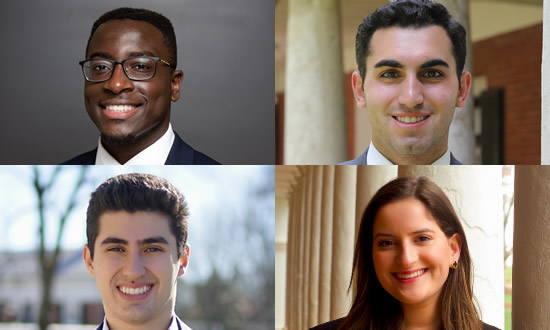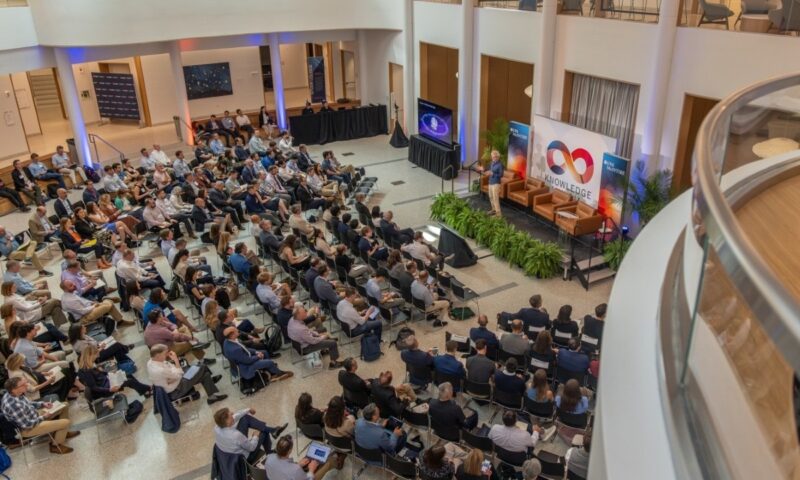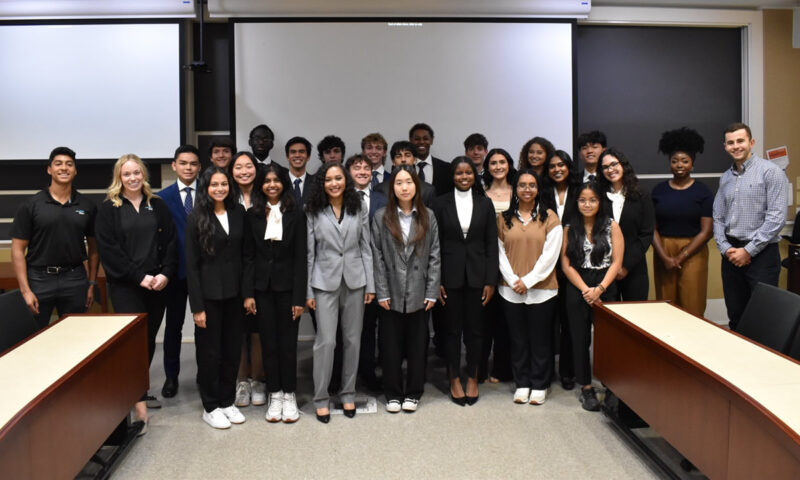
John Eshirow, Claude Karaki, David Malkin, and Danielle Rozinov
So much has happened in the past 15 months that it’s difficult to put it all in perspective. Yet some truths that came to light compelled many to act in a multitude of ways that felt long overdue. In particular, concerns about social justice and the centuries-long racial inequities that had long gone unaddressed in the U.S. emerged as critical to the country’s future success.
In light of these developments, the Virginia Venture Fund (VVF) was motivated to act. The student-led organization, which engages first- through fourth-years across Grounds with hands-on experience in the private equity and venture capital space, directed its efforts toward a timely initiative to help remedy these issues as they relate to commerce. (Learn more about VVF and faculty adviser Ed Finley.) The result came in the form of the Impact Fund, launched by the McIntire-hosted VVF to offer capital investment and strategic advisement specifically to minority-owned businesses.
The Impact Fund has already begun to make a difference. Soliciting donations from alumni strictly for educational purposes, the fund supports companies run by underrepresented populations, ventures with diverse founding teams, and businesses seeking to create large-scale social change. After much research, its first major investment was made with DrugViu. The innovative company’s platform is designed to advance drug development and research for autoimmune diseases by connecting autoimmune disease experts with minorities with autoimmune diseases; their goal seeks to overcome the incongruity in medical research, as only 6% of such studies involve non-white populations.
The investment stands to be the first of many that VVF has planned for the Impact Fund.
An Integral Part of VVF
VVF President Emeritus David Malkin (McIntire ’22), who served as Co-President with David Goldstein (McIntire ’22) and co-founded the Impact Fund with Goldstein in 2020, now holds an advisory role, sourcing potential startups for the project, developing relationships with accelerators and other venture capital firms while helping the Impact Fund assess future opportunities.
He says that while the Impact Fund was new and not without its many challenges, the idea behind it perfectly aligned with VVF’s other initiatives.
“The way we see it, VVF has four key aspects: training, projects, the National Undergraduate Venture Cup (NUVC), and the Impact Fund,” Malkin explains, pointing out how all first-year VVF members take a semester-long training program on investing fundamentals and related subjects to develop skills required for the org’s 10-week internship projects; those projects are run in conjunction with more than 15 venture capital and private equity firm partners. Though halted last year due to the pandemic, he says that the VVF’s NUVC competition normally brings students from around the country to compete as diligence teams hear startup pitches, operating much like a case competition in the venture capital space, with an accelerated pitch-to-closing deal timeline taking place in just one day.
“The Impact Fund is the culmination of all these other efforts. Drawing on members’ learnings from the first three aspects of the club, students can try to put their learnings to action by performing diligence on their own, without any guidance from a partner firm,” Malkin says.
Building the Blueprint for Success
John Eshirow (Engineering ’21) says that when Malkin and Goldstein reached out to him about leading the Impact Fund during its first year of operations as Managing Director, he felt moved by what the project aimed to achieve.
In preparing to launch the Impact Fund, VVF needed to create its own processes and procedures, with Eshirow lending his efforts to overcoming the challenges the group faced at the onset. Though Eshirow says that even though the group is made up of students with an interest in investing—and even counts some members with professional internship experiences that benefited from seeing firsthand how established funds function—they found no precedent at UVA to model what they set out to do.
“As a team, we spent many sessions brainstorming,” he recalls. “We value the diverse perspectives and backgrounds that team members bring to the table. Additionally, we reached out to various mentors, professors, and investors to help us better formulate our mission and processes.”
Malkin also believes that infrastructure was perhaps the most daunting early issue.
“While it is easy to say we are going to allocate a certain portion of our funds to investing, it is really hard to put your money where your mouth is,” he says, noting that before launching the Impact Fund, during his two and a half years with VVF, he never had to completely determine what to do on his own with projects. Yet the collaboration among leadership, faculty, and investor partners that Eshirow mentioned led to the establishment of purposeful criteria used in investment committees and determined the Impact Fund’s investment procedures.
Driven to Act
Current Impact Fund Managing Directors Danielle Rozinov (McIntire ’22) and Claude Karaki (McIntire ’22) each had their own motivations for joining the project, but they shared a desire to create positive change.
“I’ve always been fascinated by the startup space, specifically within the Charlottesville community. However, what attracted me most to the Impact Fund was its commitment to supporting and bolstering minority business ownership,” Rozinov says.
She hoped to leverage the quantitative and analytical skills that she amassed from her time in the McIntire Investment Institute, the Virginia Undergraduate Real Estate Club, and her Commerce School coursework, insisting that what excited her most about the Impact Fund was the empathetic leadership and the inventive thinking behind its construction.
“Specifically, I looked forward to engaging with founders from diverse backgrounds, hearing their unique stories, and learning about the role that these startups played in the broader communities that they served,” she says. “I’ve found that combining these interactions with the data-driven due diligence that we perform has been fundamental to how we evaluate potential investment opportunities, and the strategic role that our team plays post-investment.”
Karaki felt that it arrived at a pivotal moment—a time to help others in need—and he was drawn to the Impact Fund by its mission and strategy. “As someone who has long been interested in the venture capital and private equity world, I thought the fund could put the skills and knowledge that my peers and I had built to the best possible use. Specifically, I wanted to be a part of a group that would use capital to directly invest in historically marginalized communities,” Karaki says.
Believing that his involvement in other organizations such as AKPsi and providing free tax preparation service for low-income Charlottesville residents through Madison House’s CASH (Creating Assets, Savings & Hope) program allowed him to draw on his finance background, Karaki says it also provided a platform for making a difference within the community.
“My goal was not only to learn how to look at startups on an investing level, but also how to find opportunities to drive measurable differences in historically marginalized communities. I hoped that I would bring a sense of determination to find an ideal startup partner, a diligent and systematic approach to analyzing a company’s potential, and a strong desire to work with a team dedicated to using financial and operational capital to better our shared society,” he says.
Though Rozinov started with little venture capital experience, she says she learned a tremendous amount through her interactions with her team and by immersing herself in meetings with founders. “I’m really grateful to John Eshirow, as well, who was an amazing leader and showed me the ropes when I first joined the fund,” she says.
“As the Impact Fund continues to grow and our pipeline continues expanding, I’m looking forward to continuing to fine-tune our diligence processes and defining the metrics that we plan to use to measure ‘impact,’ as these are some of the gray areas we’re currently facing,” she adds.
Karaki finds that it has been challenging to develop the ability to quickly assess startup opportunities. “After having met with over 40 startups so far with other members of the team, I’ve come to put more weight on the founder, the idea’s potential market fit, and its alignment with the Impact Fund’s goal of driving positive societal change,” which he explains by using DrugViu as an exemplary, as their first major investment fit three of those categories.
Commerce for Communities
Serving as Managing Directors for the Impact Fund has enhanced the McIntire student experience for those at the helm.
“I’ve been lucky enough to engage with incredibly bright, motivated students, while applying the lessons I’ve learned from the Integrated Core Experience in a tangible way,” says Rozinov, stressing how her refined soft skills from the Commerce School’s hallmark undergraduate program have been invaluable for communicating with founders and team members. She also credits Professor Eric Martin’s Managing Innovation course for its attention to the iterative processes and consumer empathy that lie behind so many successful, innovative startups. “It was foundational to how I evaluate the companies in our pipeline. Ultimately, my time in the Impact Fund has been an incredible indicator of how much McIntire truly prepares its students for the ‘real world.’”
Karaki says that experience has made tangible many of the concepts he learned in courses such as Intermediate Corporate Finance, Venture Capital & Emerging Firms, and the Finance sessions from the Integrated Core Experience. “More importantly, I believe the fund demonstrated to myself and my peers that these skills learned in the classroom can be used beyond preparing students for the professional world,” he says, “and in fact, they should be put to use helping society.”
That crucial effort toward the betterment of communities both local and global is what remains a true source of pride for those who launched the Impact Fund.
Impact Fund Co-Founder Goldstein was proud of the team’s ability to execute during its early stages and act in a meaningful way. “In a matter of weeks, we were able to establish the fund, build out the team with John at the helm, raise funding, and start sourcing investments that would really make an impact.”
For his part, Eshirow remains gratified by the Impact Fund’s mission to bolster minority business ownership through capital investment and strategic advisement, as well as its ongoing refinement of its criteria. “We have developed the investment criteria to keep us honest in our investments. We believe that we can make the most impact by primarily investing in minority-owned businesses and/or businesses that can make an outsized impact in traditionally marginalized communities,” he says.
Malkin says that he was always interested in creating large-scale positive change at UVA and in the broader community, but never found an opportunity as fitting as the Impact Fund. “I truly believe we set up a program that has the foundation needed to survive many years at McIntire. While the fund is only writing checks on the smaller side, we are still having a dramatic impact on supporting minority-owned businesses and helping the company operationally.”
Going forward, Karaki says the Impact Fund intends to continue expanding its network and investing in a greater number of impactful businesses, hoping that its growing portfolio will result in an increase in societal impact deriving from their investments to create a self-sustaining support source.
“Another major plan for the fund is to expand the team,” says Karaki. “I believe this goal is incredibly important, not only to increase our capacity to analyze more startups, but also to help younger students understand how venture capital and private equity can be vehicles to drive positive change in our communities.”
Malkin puts the entire experience in perspective as it relates to Commerce and its potential as an engine for significant and supportive community endeavors.
“As McIntire students, we all bring a unique perspective and eagerness to apply what we are learning in the classroom. I am proud that I have found likeminded students who are interested in making a difference, helping in the fight against racial inequities and systemic inequalities—and in learning by doing within the field of impact investing.”


